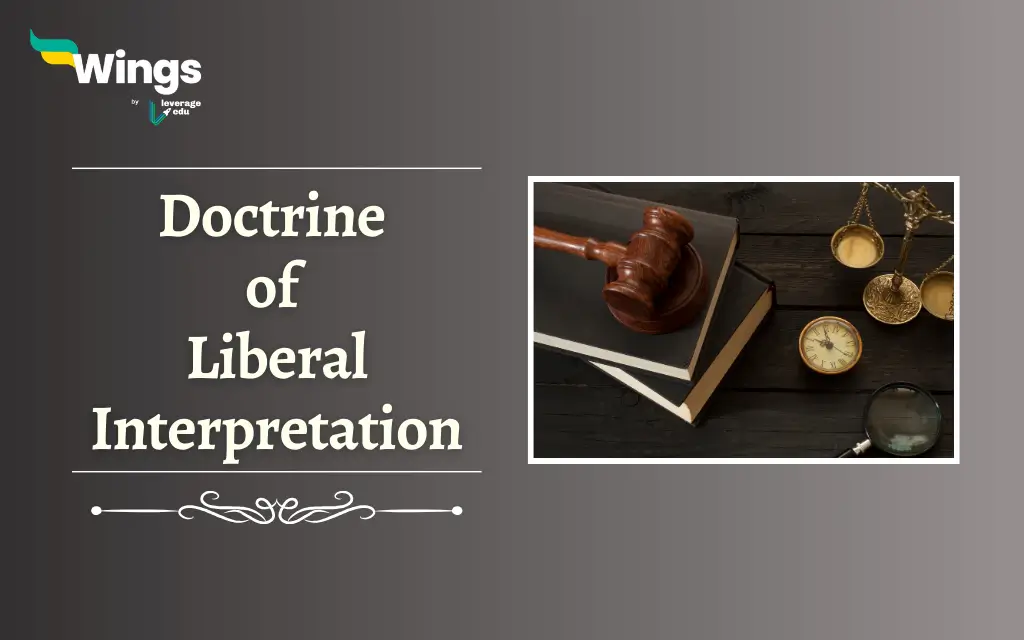In India, the Doctrine of Liberation states that the Indian Constitution must be interpreted liberally and broadly, not in a narrow sense. In other words, the interpreters of the Constitution should be motivated by a liberal and wide spirit. Read this blog to learn more about the Doctrine of Liberal Interpretation in India, the Difference between the Doctrine of Liberal Interpretation and the Doctrine of Literal Interpretation, the Doctrine of Purposive Interpretation and the Doctrine Of Creative Interpretation.
Contents
What is the Doctrine Of Liberal Interpretation?
The Doctrine Of Liberal Interpretation means that the Constitution should not be interpreted as a mere law but as a living thing through which laws are made, hence it should be interpreted broadly.
Moreover, the Supreme Court of India while explaining the Doctrine Of Liberal interpretation, stated that:
- Any constitutional provision is always evolving and always dynamic.
- The constitutional provisions must receive a broad interpretation and not a narrow one.
- In addition, Fundamental Rights should not be cut down.
- Entries in the legislative lists are to be read in a liberal and broad sense.
- When interpreting words in a Constitution that gives the power to make laws.
Also Read: What is Doctrine of Severability?
Differences between the Doctrine of Liberal Interpretation and Doctrine of Literal Interpretation
On one hand, the Doctrine of Liberal Interpretation states to interpret Constitutional laws broadly and liberally. On the other hand, the Doctrine of Literal Interpretation strictly follows the literal or exact meaning of the words without considering their broader context or intent. Here are the differences between the two with the help of a table:
| Literal Interpretation | Liberal Interpretation |
| Adheres strictly to the exact meaning of words. | Understands words broadly. |
| Limited flexibility, focuses on the literal meaning of the text. | Has flexibility and aims at providing liberal meaning to the text. |
| Does not consider the broader context of a text. | Understands the broader context of a text. |
| Applies laws narrowly. | Provides adaptability in applying laws. |
Other Doctrines under the Doctrine Of Liberal Interpretation
The other two Doctrines that can come under the umbrella of the Doctrine Of Liberal Interpretation are as follows:
Doctrine of Purposive Interpretation
Additionally, the Doctrine of Purposive Interpretation clearly states that:
- In constitutional matters, Purposive Interpretation involves examining the reasoning behind the inclusion of a specific provision in the Indian Constitution.
- Moreover, it emphasizes how important it is to comprehend the intent or goal underlying constitutional provisions.
- This method highlights the need for Constitutional interpretation to aim to understand the framers’ intentions.
- Courts seek to guarantee that the law is consistent with the original meaning and goals of the Constitution’s framers by concentrating on the purpose of constitutional provisions.
- The goals of the constitutional provisions and the intentions of the drafters are clarified by the Preamble to the Constitution and the Constituent Assembly Debates.
Also Read: Doctrine of Territorial Nexus: Concept, Case Example, Exceptions
Doctrine Of Creative Interpretation
The Doctrine of Creative Interpretation states that the courts of our country should work on new concepts and evolve new techniques to meet the requirements of new and challenging situations. Furthermore, there are landmark judgments that have had a creative role by the Supreme Court of India, which are as follows:
| Cases | Creative Judgements |
| Golak Nath Case (1967) | The Supreme Court, for the first time, introduced the American Doctrine of Prospective Overruling. |
| Kesavananda Bharati Case (1973) | In this case, the Supreme Court innovated a new constitutional Doctrine called the Doctrine of the Basic Structure of the Constitution. This judgment is registered as a watermark of judicial creativity in India. |
Related Blogs
| What is Adjournment Motion? | What is Fiscal Federalism? |
| What is the Doctrine of Colourable Legislation? | What is a Writ of Prohibition? |
| What is the Difference between Fundamental Rights and Directive Principles? | What is the Difference between Fundamental Duties and Directive Principles? |
| What is Universal Adult Franchise? | What is the Difference Between Fundamental Rights and Fundamental Duties? |
FAQs
The Doctrine of Liberal Interpretation emphasizes interpreting the Indian Constitution broadly and liberally, highlighting its dynamic and evolving nature. This approach ensures that constitutional provisions are applied flexibly and adaptably to meet changing societal needs.
While the Doctrine of Liberal Interpretation advocates for understanding constitutional provisions broadly and flexibly, the Doctrine of Literal Interpretation strictly adheres to the literal or exact meaning of the words without considering their broader context or intent.
The Supreme Court has emphasized that constitutional provisions must receive a broad interpretation. Fundamental rights should not be curtailed, and legislative entries should be interpreted liberally. Additionally, words granting legislative power should be understood in the broadest way possible to have the most impact.
Two other important doctrines are the Doctrine of Purposive Interpretation and the Doctrine of Creative Interpretation. Purposive Interpretation focuses on understanding the intent or goal behind constitutional provisions, while Creative Interpretation allows courts to innovate new concepts and techniques to address emerging legal challenges.
Lastly, we hope you liked our blog and gained an understanding of the Doctrine of Liberal Interpretation in India. Moreover, you may even read more blogs and empower yourself with knowledge regarding Civics and Polity!


 One app for all your study abroad needs
One app for all your study abroad needs












 60,000+ students trusted us with their dreams. Take the first step today!
60,000+ students trusted us with their dreams. Take the first step today!